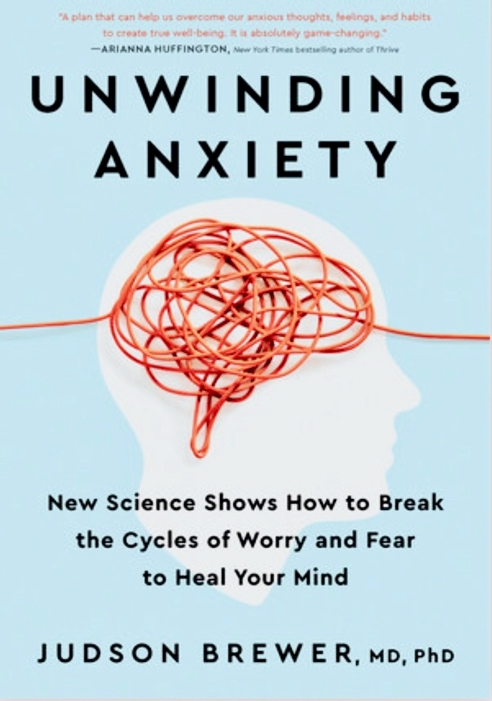By Wanda Deschamps (May 6, 2021)
Unwinding Anxiety: New Science Shows How to Break the Cycles of Worry and Fear to Heal Your Mind, Judson Brewer, PenguinRandomHouse, March 9, 2021, 304 pp., $30.90

Unwinding Anxiety speaks from both the brain and the heart. Author Dr. Judson Brewer has experiential knowledge and education in the topic of mental health and writes in a style that places him in the book alongside the reader.
“My own history with anxiety goes back much further. I’m a doctor – a psychiatrist, to be precise. Only after years of struggling to help my patients overcome their anxiety and continually feeling like I was missing something important in their treatment did I connect the dots between anxiety, my lab’s neuroscience research on habit change, and my own panic attacks.”
Brewer openly admits his own experiences and struggles,
“When I graduated from medical school and started my residency training at Yale, I found that not only was psychiatry a good fit for me, but I developed an even deeper connection to my patients who struggled with addictions. I had started meditating at the beginning of medical school and had continued doing so on a daily basis during my eight years of MD/PhD training. As I learned more about my addicted patients’ struggles, I realized they were talking about the same type of struggles that I had learned about in my own meditation training – those connected feelings of craving, clinging, grasping. To my surprise, I found we shared a language and struggle.”
This revelation is astonishing. Until recently, it would have been considered taboo for a psychiatrist to openly admit their own mental health challenges especially in a way that forms connections with the patient. Terms such as lived experience and experiential knowledge—now part of our vernacular—have only started to be recognized.
He pre-empts the consideration that he is too close to the subject to provide critical and valuable analysis.
“I can promise you there is plenty of science in this book. And, it’s actual science, based on studies my lab has done over many years and with real participants, first at Yale, now at Brown University. I’ve also published the papers that other people read and write books about, so we’re covered there too.”
A strength of the book is that it addresses a basic and important tenant—to address your anxiety you have to know that you have it. Again, Brewer draws from his lived experience to explain how easily one can dodge their own condition and adds the multiplier effect of how anxiety presents differently on an individual basis and in varying circumstances.
More a reference guide than a sit down and read, “Unwinding Anxiety” is easy to follow, with twenty-three chapters over three sections:
- Understanding Your Mind
- Mapping Your Mind: First Gear
- Updating Your Brain’s Reward Value: Second Gear
- Finding That Bigger, Better Offer for Your Brain: Third Gear
Chapter four, Anxiety as a Habit Loop, grabbed me. Interconnectivity between anxiety and habit was not something I had considered and if it is new to you as well, you are not alone. Brewer explains,
“When I’m teaching seminars or being interviewed about habit loops, I find that few people understand that anxiety can be a habit loop.”
It is beneficial to explore and within in sits the crux of Brewer’s step-by-step plan to break the cycle of anxiety.
It is interesting that, Brewer chose being “wound up” as the metaphor for anxiety.
His theory is based on practicing unwinding through being curious about the root of your feelings. So, the “unwinding” will take conscious effort and practice. Brewer, however, assures the reader that the investment is worth it.
“Once you get the hang of this, see how often you can repeat this exercise throughout the day. Whenever a difficult emotion arises, see if this exercise can open you up to leaning into the emotion and learning from it (and about yourself), while at the same time working to solidify the practice of being curious.”
This book is supported by the personal brand of Dr. Brewer. If you visit his website, you will see a series of TED Talks and highlights from news coverage. There is even an app. That being said, the approach to the book is supported by evidence and science. I am not a clinician, but it appears to be solidly backed by scientific journals.
Unwinding Anxiety covers a broad perspective.
There are no deep dives on gender, race, ethnicity, religion, or neurotypes. So, if an intersectionality approach is what you are looking for this is not the book for you. It is, however, user-friendly, digestible, and relatable. On the concluding page, Brewer invites readers to contact him via email with thoughts and suggestions.
At a time that the value of lived experience is gaining momentum, anxiety is in our collective conscious right now. It will be interesting to understand if in ten years personal perspectives of mental health professionals are consistently and commonly shared.
(Wanda Deschamps is founder and principal of Liberty Co, a consultancy working to increase the participation level of the neurodiverse population in the workforce.)
Other reviews by Wanda Deschamps
How to lose everything: Unimaginable and uplifting February 11, 2021
The Art of Logic: Arriving Just in Time January 28, 2021
Tomboy: Has appeal for all readers November 24, 2020
Trampled by Unicorns: Big Tech’s Empathy Problem November 9, 2020
Calling Bullshit: ‘There are three kinds of lies: lies, damned lies, and statistics.’ November 4, 2020
The Conscious Creative: Creating your own values-driven practice October 6, 2020
The Power of Disability: A book about life June 9, 2020
I Overcame Autism: Moving autism further into the public conscience April 28, 2020